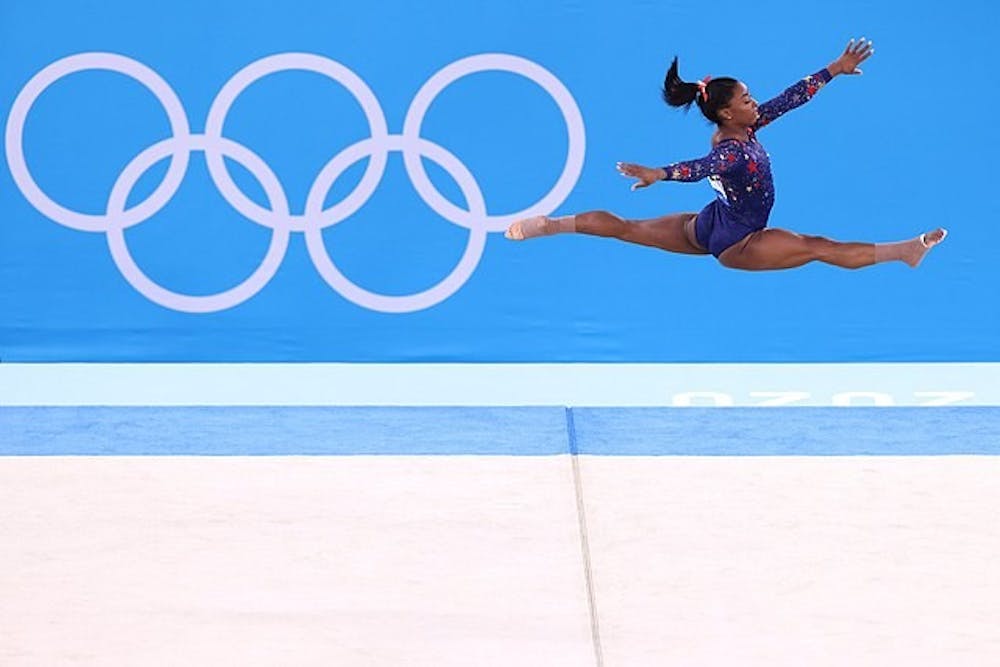Simone Biles is the most decorated gymnast in world championship history. Biles began competing at the senior gymnast level when she was only 16, earning four medals in her first world championship in Antwerp, Belgium. Now, at age 24, she holds 25 medals total from the Olympics and World Championships, with 19 of those being gold medals. Eight years later, she still finds herself at the helm of gymnastics, culminating in the Tokyo 2020 Olympics.
Biles’ impact reaches far beyond her medal count, though. She is a strong advocate for the younger generation by bringing tough issues to light. Biles uses her platform to share her experiences as a foster care kid and sexual assault survivor — even speaking out against USA Gymnastics for failing to conduct a private investigation against alleged assaulter and former team doctor, Larry Nassar. Time and time again Simone Biles has shown up. She has shown up for her team, for the youth of the country and for anyone affected by assault. Yet this summer, some argued that Biles could not show up for herself.
Some may find her inability to compete an unpatriotic, weak or even selfish act. Make no mistake — Biles’ withdrawal from both women’s individual and team gymnastics events is selfish. But it is a healthy kind of selfish, in that she put her mental health first. This selfishness is necessary — vital even — to protect your mental wellbeing. Her withdrawal was far from weak or unpatriotic, though. Biles stated in a post-competition interview July 27 that she was hesitant to compete, saying, “But then once I came out here, I was like no, mental's not there, so I just need to let the girls do it and focus on myself.” Biles' citation of mental health as her deterrent is important to recognize, as we often see athletes as invincible superhumans.
Biles later stated, “I say put mental health first … So it's OK sometimes to even sit out the big competitions to focus on yourself, because it shows how strong of a competitor and person that you really are, rather than just battle through it.”
So, no, Biles is neither weak nor unpatriotic. She is quite the opposite. She was strong enough to prioritize her mental health so that she did not jeopardize her physical health later on. By doing so, she avoided further injury that often comes with the “twisties” — gymnastics jargon referring to the lack of spatial awareness felt in mid-air while performing skills — which could lead to serious injury. She was patriotic enough to leave the competition to the rest of her team, who ended up earning a silver medal.
Statistically speaking, one in five American adults has experienced a mental health issue. Yet it is rarely brought up in news outlets, let alone at your own dinner table. Instead we keep these battles to ourselves, hiding it from the public eye in hopes of meeting societal standards. So much time is lost in the process of suppressing our ailments, when we should be fixing the standard that keeps them hidden to begin with.
Simone Biles did that on July 27. Even as the most decorated gymnast in world championship history, Biles struggles with her mental health. But instead of risking her physical health by continuing on in her events, she vocalized her limits.
I stand with Simone’s actions. It is long past time we start prioritizing our mental health. It does not make you weak to withdraw from overbearing obligations. It makes you strong. Put your mental health first. Focus on yourself first. Because when we start to recognize our own health, we can lead lives which help others recognize theirs, too.
Grace Duregger is an Opinion Columnist for The Cavalier Daily. She can be reached at opinion@cavalierdaily.com.
The opinions expressed in this column are not necessarily those of The Cavalier Daily. Columns represent the views of the authors alone.







